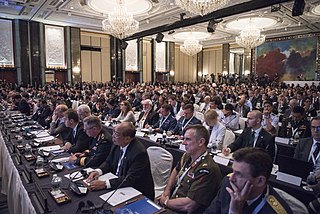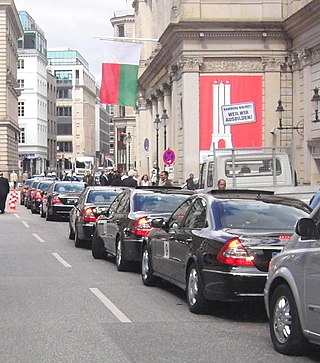
Asia-Pacific Economic Cooperation is an inter-governmental forum for 21 member economies in the Pacific Rim that promotes free trade throughout the Asia-Pacific region. Following the success of ASEAN's series of post-ministerial conferences launched in the mid-1980s, APEC started in 1989, in response to the growing interdependence of Asia-Pacific economies and the advent of regional trade blocs in other parts of the world; it aimed to establish new markets for agricultural products and raw materials beyond Europe. Headquartered in Singapore, APEC is recognized as one of the highest-level multilateral blocs and oldest forums in the Asia-Pacific region, and exerts significant global influence.

The Shanghai Cooperation Organisation (SCO) is a Eurasian political, economic, international security and defence organization established by China and Russia in 2001. It is the world's largest regional organization in terms of geographic scope and population, covering approximately 80% of the area of Eurasia, 40% of the world population. As of 2021, its combined GDP was around 20% of global GDP.

The IISS Asia Security Summit: The Shangri-La Dialogue (SLD) is a "Track One" inter-governmental security conference held annually in Singapore by an independent think tank, the International Institute for Strategic Studies (IISS). The dialogue is commonly attended by defence ministers, permanent heads of ministries and military chiefs of mostly Asia-Pacific states. The forum's name is derived from the Shangri-La Hotel in Singapore, where it has been held since 2002.

The Forum on China–Africa Cooperation (FOCAC) is an official forum between the People's Republic of China and all states in Africa with the exception of the Kingdom of Eswatini. It is the primary multi-lateral coordination mechanism between African countries and China and since 2018 is viewed by those countries as a cooperation platform within the Belt and Road Initiative.

The China–Japan–South Korea trilateral summit is an annual summit meeting held between the People's Republic of China, Japan and South Korea, three major countries in East Asia and the world's second, third and 12th largest economies. The first summit was held during December 2008 in Fukuoka, Japan. The talks are focused on maintaining strong trilateral relations, the regional economy and disaster relief.

The St. Petersburg International Economic Forum is an annual Russian business event for the economic sector, which has been held in St. Petersburg since 1997, and under the auspices of the Russian President since 2006. Each year, more than 10,000 people from over 120 different countries take part. The Forum brings together the chief executives of major Russian and international companies, heads of state, political leaders, prime ministers, deputy prime ministers, departmental ministers, and governors.

The Hamburg Summit: China meets Europe is a biennial high-level conference on Sino-European economic relations held in Hamburg. The Hamburg Chamber of Commerce initiated the first "Hamburg Summit" in 2004 to set up a platform for an open dialogue between Europe and China and to improve their economic relations.
The 2012 SCO summit was the 12th annual summit of the Shanghai Cooperation Organisation.
The Astana International Forum (AIF) is an international and regional platform for dialogue and a nonprofit organization headquartered in Astana, Kazakhstan. Previously called the Astana Economic Forum, it has been organized by the Government of Kazakhstan since 2008. The name change reflects the broader range of topics discussed at the forum, such as climate, food and energy security and is intended to draw of attendees from around the world. The Forum is organized by the Government of Kazakhstan, which includes the Economic Research Institute, Ministry of National Economy and Ministry of Foreign Affairs. A meeting is held each year in Astana in which more than eight thousand delegates from one hundred countries are brought together: they include chief executive officers, politicians, journalists, scientists and Nobel Prize laureates. The 2023 Forum will be launched under the initiative of President Kassym-Jomart Tokayev.

The Belt and Road Initiative, known within China as the One Belt One Road or OBOR/1B1R for short, is a global infrastructure development strategy adopted by the Chinese government in 2013 to invest in more than 150 countries and international organizations. It is considered a centerpiece of the Chinese leader Xi Jinping's foreign policy. The BRI forms a central component of Xi's "Major Country Diplomacy" strategy, which calls for China to assume a greater leadership role for global affairs in accordance with its rising power and status. It has been compared to the American Marshall Plan. As of August 2023, 155 countries were listed as having signed up to the BRI. The participating countries include almost 75% of the world's population and account for more than half of the world's GDP.

Diplomatic relations between the Republic of Azerbaijan and the People's Republic of China were established on April 2, 1992. The relations between the two countries have developed smoothly and high-level exchanges have been close. The PRC embassy in Baku openly commends Azerbaijan for supporting its stance on the political status of Taiwan, Tibet's sovereignty, the conflict in Xinjiang, and the suppression of Falun Gong. All political forces have actively advocated strengthening friendly cooperation with China. China was one of the first countries to recognize independence. President Aliyev came to China in August 2008 and May 2014 to attend the opening ceremony of the Beijing Olympic Games and the fourth summit of the Asia Cooperation and Confidence Measures Conference. In March 2005 and December 2015, he twice went to China for state affairs. access. In June 2018, the President of the National Assembly, Assador, visited China. In May 2016, Special Envoy of Chinese Communist Party (CCP) general secretary Xi Jinping, member of the Political Bureau of the CCP Central Committee and Secretary of the CCP Central Political and Legal Affairs Commission Meng Jianzhu visited Afghanistan. In June of the same year, Zhang Gaoli, member of the Standing Committee of the Political Bureau of the CCP Central Committee and Vice Premier of the State Council, visited Azerbaijan.
The Belt and Road Forum for International Cooperation is an international political and economic forum of the Belt and Road Initiative.

The 2017 SCO summit was the 17th annual summit of heads of state of the Shanghai Cooperation Organisation held between 7 - 10 June in Astana, Kazakhstan. The upgrading of the membership of India and Pakistan to full members was one of the major topics, beside from security related topics, the Belt and Road Initiative and economic cooperation.

The 2019 G20 Osaka summit was the fourteenth meeting of the G20, a forum of 19 countries and the EU that together represent most of the world economy. It was held on 28–29 June 2019 at the International Exhibition Center in Osaka. It was the first G20 summit to be hosted by Japan.
In 1991, Azerbaijan joined the Organisation of Islamic Cooperation and started to build relations with the organization. As a result, the ambassador of Azerbaijan to Saudi Arabia was given a mandate of permanent representative of Azerbaijan to the General Secretariat of the OIC in May 1994.

APEC China 2001 was a series of economic and political meetings between the 21 member states of the Asia-Pacific Economic Cooperation forum held in the People's Republic of China during 2001. Various meetings were held across the country, with leaders from all the member countries meeting 20–21 October 2001 in Shanghai.

The 3rd Belt and Road Forum for International Cooperation will be held between 17 and 18 October 2023 in Beijing, China. It will mark the 10th anniversary of the Belt and Road Initiative (BRI).













